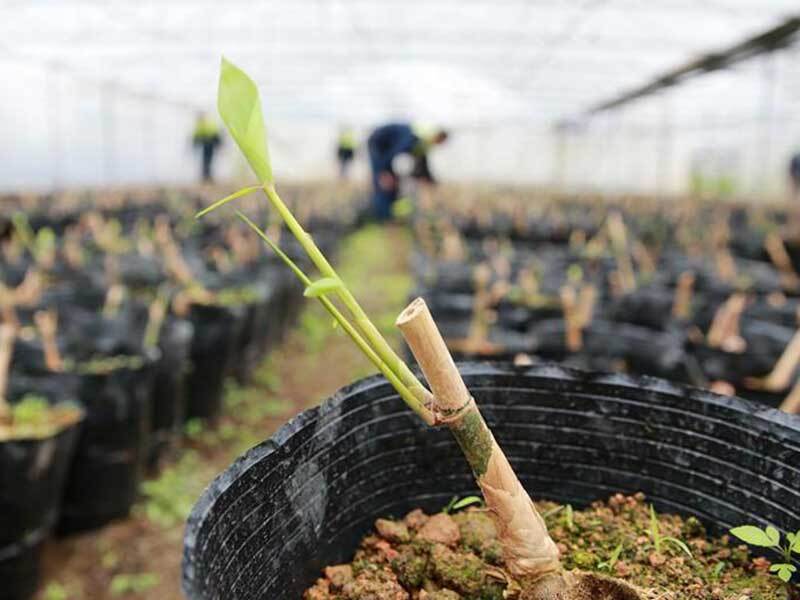Bamboo is an emblem of versatility and resilience. Known for its rapid growth and numerous practical uses. Can you grow bamboo in Michigan? Michigan's climate may present challenges. But with the right care, planting bamboo in Michigan is proseable.
Phyllostachys is a genus of bamboo. It is at the forefront of cold-hardy varieties. The Phyllostachys nuda and Phyllostachys bissetii prove resilient in temperatures as low as -20°F.
Pleioblastus distichus has compact stature and ground cover properties. The spectacular Fargesia has non-invasive clumping behavior. You can use it to intersperse shade, create privacy screens, or even dabble in bamboo crafts.
When growing bamboo in Michigan, you should recognize cold tolerance, height, and your garden space. Soil type and sunlight exposure are key considerations as well. Most bamboos prefer moist, well-draining soil and a mix of direct and shade-dappled sunlight.
Bamboo roots are prolific. You should make sure the soil is well-drain. Preparing the soil correctly can provide good drainage. This also prevents the bamboo from spreading uncontrollably.
Testing your soil pH before you start growing potted bamboo for privacy. Aim for a slightly acidic pH level between 5.5 to 6.5. This is optimum for most bamboo that grows in Michigan.
You can incorporate plenty of organic matter. For example, compost, well-rotted manure, or leaf mold. Bamboo is a heavy feeder. So add balanced organic fertilizer to improve soil fertility. For example, 10-10-10. This will support the plant during the growing season.
The best time to plant bamboo in Michigan is during the spring, after the last frost. The rhizomes will have enough time to establish their root systems before winter.
Dig a hole two to three times wider than the rhizome and just as deep. The rhizome will spread without becoming root-bound. Then, place the rhizome into the center of the hole. Ensure the bamboo growing tips are facing upward. The top of the rhizome should sit just below the soil surface.
Gently backfill the hole with soil. Tamping it down lightly as you go to remove any air pockets. Water the newly planted bamboo thoroughly. This settles the soil and provides essential hydration to the rhizome.
Plant each rhizome at a distance of at least 3 to 5 feet, depending on the species. This prevents overcrowding and allows ample space for growth. You should consider the ultimate size of the bamboo variety and plan accordingly.

Bamboo that will grow in Michigan enjoys consistent moisture, especially during the dry months. In Michigan, a weekly deep watering will suffice. But adjust based on rainfall and the specific requirements of your bamboo variety.
Apply organic mulch around the base of potted bamboo for privacy. For example, wood chips, leaf litter, or even the pruned leaves of your bamboo. This can conserve soil moisture and keep weeds at bay.
Bamboo is a heavy feeder. It benefits from the occasional application of a balanced fertilizer, especially in the spring and early summer.
Stay on top of pruning to prevent bamboo from taking over your garden. Regularly remove new shoots that emerge outside the desired area. Prune old, dead, or drooping canes to maintain a tidy appearance.
For particularly harsh winters, consider wrapping delicate bamboo canes with burlap. This shields them from cold, drying winds. Applying a thick layer of mulch around the base of your plants. This can also help insulate the roots.
Bamboo is generally resilient to pests. But you should pay attention to signs of damage. Use organic pest control methods when necessary. Also, ensure your bamboo is not stressed from overwatering or soil depletion.
Regularly inspect and maintain barriers or dig trenches around the bamboo stand to keep rhizomes at bay. If you notice a particularly aggressive spread, you may need to consider more robust containment methods. For example, pouring concrete barriers around the bamboo.
If your bamboo is not thriving, it could be due to soil nutrient deficiencies, insufficient sunlight, or incompatible growing conditions. Conduct soil tests to identify any issues and amend as necessary.
Monitor sunlight patterns in your garden and adjust as needed. In case of severe climatic events, protect bamboo plants in Michigan with burlap screens or temporary shelters.
You should cut bamboo during the right phase of the moon. This ensures longevity and quality of the harvest. Once harvested, cure bamboo to increase its durability. Especially when using bamboo in outdoor structures or for projects that require resistance to the elements.
Bamboo has inherent strength and flexibility. It is a material of choice for numerous projects. In Michigan, you can construct garden structures from bamboo. For example, trellises, raised beds, and even pergolas.
Additionally, utilizing bamboo in privacy screens or barriers can combine function and form in the garden landscape. The DIY possibilities with bamboo are endless. Create bamboo wind chimes, furniture, and even art installations.
Can bamboo grow in Michigan? Growing bamboo in Michigan does require some adjustments. With proper knowledge and care, it's possible to foster a connection with this remarkable plant.
Hot Products:
plug trays wholesale seedling trays wholesale canadacell flats heavy duty seed module trays ukcloning tray polystyrene seed trayshard plastic seedling trays australia commercial seed traysroot trainer trays plastic seed trays nzseed trays ireland germination flatsair pruning trays modular seed trayssoil block trays seedling trays wholesale south africaName: Vincent Lee
Phone: 0086-15838107808
Wechat: Wilson15838107808
Whatsapp: 0086-15838107808
Email: vincentwilsongarden@gmail.com